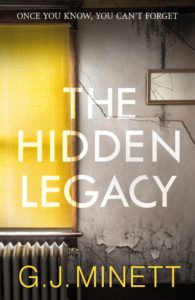GJ Minett (The Hidden Legacy) – My Writing Commandments
The Hidden Legacy has been gathering rave reviews since it first released as an e-book earlier this year. The paperback edition released on 25th August and is now finding its way into the hands of many new readers.
I am delighted to welcome the author of The Hidden Legacy, GJ Minett, to the blog today to share his 5 writing commandments.
 Five Writing Commandments I Live By
Five Writing Commandments I Live By
Here we go. In no particular order, and with no guarantees that I manage to live up to any of them:
- GET OFF SOCIAL MEDIA, FOR GOD’S SAKE!
This used not to be a problem. For years I resisted the siren call of Facebook and tweets were something I welcomed through the bedroom window. Nothing … NOTHING was going to tempt me to goo over pictures of puppies and kittens or start taking an interest in what someone had for breakfast. Then I got a book deal. First meeting with my editor, I told him confidently: I don’t do social media. His response: you do now.
Now I find it desperately difficult to ignore it. I can be approaching the most dramatic moment in the chapter and it will suddenly occur to me that I haven’t checked for 20 minutes to see whether so-and-so has responded to my last tweet or how many places my novel has risen or fallen in the Amazon rankings.
TURN IT OFF. Turn off the notifications, the beep alerts, the silly little pings that whisper insidiously in your ear that if you don’t check now, you’ll miss out on something momentous. If you don’t, you’ll never get anything done.
- Tell a story
People read novels for a variety of reasons. Not many though, I would hazard a guess, will have picked up your novel because they want to have a personalised agenda thrust down their throat. Very few will be expecting to dive into a dictionary to look up every fifth word because you’re so keen to demonstrate the extent and complexity of your vocabulary. Just tell the story and avoid trying to be too clever.
- Give them characters they can believe in
Not only that, make them characters they will care about. It’s only a personal preference but I tend to start with a character rather than a detailed plot. I carry them around with me in my head for a month or two, developing them while I exercise, asking myself how they would react to a news item on TV. I draw up checklists of what they eat, read, wear for different occasions and at different times of the year, what their guilty secrets and deepest fears might be. Then, once I have them clearly defined in my head, I start thinking about the situation I want to put them in and the dilemma or crisis I want them to confront because without conflict of some sort there is no real story.
- Appeal to the senses
Ellie, one of my fellow workshop students on the MA in Creative Writing at the University of Chichester, was an invaluable help to me whenever I started to ‘plot-trot’. She would send work back to me complaining that she felt excluded from what I was writing. She felt like a detached observer, denied the opportunity to empathise as much as she would have liked, because I wasn’t giving her enough to get hold of. “Put me in the scene,” she would implore me. “What can I see? What can I smell, hear around me? Let me touch things.” I needed frequent reminders and was grateful for them. The scene in The Hidden Legacy when Ellen first visits the cottage has attracted a certain amount of favourable comment and a lot of that is down to the advice I received. Bring the senses into play and include your reader at every opportunity.
- Trust your instincts, but …
There must be thousands of novels I’ve considered and not written. Ideas keep popping into my head and out again. Sometimes though an idea comes back and that’s usually a sign for me that it has legs, as they say. We might be able to go somewhere with it.
By and large I trust my instincts about whether it’s the right story and also regarding the quality of what I’m producing. I’m far from infallible though and it’s at times like this that you need the right people around you.
A while ago I dashed off a second book to follow on the heels of The Hidden Legacy. I persuaded myself it was good enough. It wasn’t … and fortunately my agent, Peter Buckman, told me to put it in a drawer, chalk it up to experience and write a better one.
And when I completed Lie In Wait, even though it had sneaked past this redoubtable gatekeeper, I received several pages of notes from my editor, Joel Richardson, with suggestions as to things I ‘might like to consider’. It’s not exactly a different book now but it is a much better one.
So … 5 commandments that work for me. I hope they do the same for you.
The Hidden Legacy is available in paperback and digital formats and can be ordered here: https://www.amazon.co.uk/Hidden-Legacy-Gripping-Psychological-Drama/dp/1785770144/ref=sr_1_2?s=books&ie=UTF8&qid=1472772377&sr=1-2&keywords=gj+minett
Lie in Wait released on Kindle on 25th August 2016 and can be ordered by clicking through on this link: https://www.amazon.co.uk/Lie-Wait-gripping-crime-thriller-ebook/dp/B01F91HUPC/ref=sr_1_1?s=books&ie=UTF8&qid=1472772442&sr=1-1
